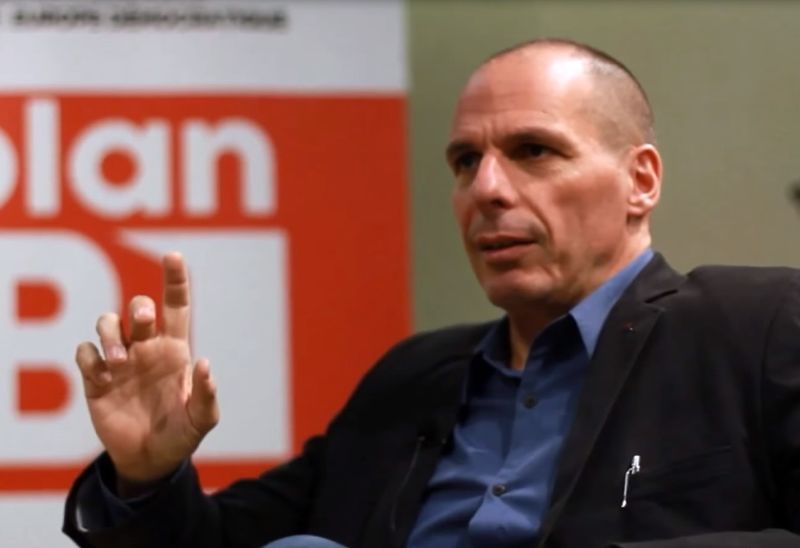Politicians tend to commit new sins to cover their old offenses. And political systems are proving its worth by quick closure serial mutually reinforcing political mistakes of their officials. Judging by this standard, the euro area, including the 19 established democracies, is lagging behind the undemocratic largest economy in the world.
After the start of the economic downturn that followed the global financial crisis in 2008, Chinese policymakers have spent seven years replacing the reduced demand for their country's net exports of national investment bubble, inflated by local governments aggressive land sale. And when the moment of reckoning came this summer, Chinese leaders have spent $ 200 billion of hard-earned foreign currency reserves trying to hold back a wave of stock market decline.
However, compared with the European Union, the Chinese government’s efforts to rectify its mistakes – which eventually allowed interest rates and the value of shares to slide - seem a model of speed and efficiency. Indeed, Greece has failed "fiscal consolidation and reform program". Along with this, the fact that EU leaders picked on her, despite five years of evidence that the program could not be successful, is one of the obvious signs of insolvency of European governance, which has deep historical roots .
In the early 1990's painful demise of the European exchange rate mechanism only strengthened the resolve of EU leaders to support it. The larger the scheme was presented as unstable, the more stubbornly officials clung to it - and the more optimistic is their statement of facts.
The last five years of economic policy in the euro area were amazing comedy of errors. The list of the political errors is almost endless: the European Central Bank’s raise of interest rates in July 2008 and again in April 2011; the imposition of severe austerity on the economy facing the worst recession; authoritative treatises for pro-competitive devaluation to the detriment of domestic partners; and banking union, which lacks the corresponding deposit insurance scheme.
How can European politicians get away with it? In the end, their political impunity is in sharp contrast not only with the United States, where officials are at least accountable to Congress, but also with China, which can be justified in thinking that their officials are less responsible than their European counterparts. The answer lies in the fragmented and deliberately informal nature of the monetary union in Europe.
Chinese officials cannot be responsible for a democratically elected parliament or congress; yet government officials have a unitary body - the seven members of the Politburo Standing Committee, to which they have to report their failures. The Eurozone, on the other hand, is officially regulated by the informal Eurogroup, comprising the finance ministers of the Member States, as well as representatives of the ECB and, when discussing the "economic programs in which it participates," International Monetary Fund.
More recently, as a result of intensive negotiations of the Greek government with the creditors, European citizens understood that the largest economy in the world, the euro area, is governing by a body, which has no prescribed rules of procedure, discusses the key issues “confidentially” and without logging, and is not obliged to answer any elected body, even the European Parliament.
It would be a mistake to regard the confrontation between the Greek government and the Eurogroup as a clash between leftist and conservative channel of Greece in Europe. Our "Athens Spring" was something deeper: the right of a small European country to challenge the failed policies that destroyed the prospects of generation (or two), not only in Greece but also in other parts of Europe.
Athens Spring was suppressed for reasons that had nothing to do with the policies of the left wing of the Greek government. Time after time, the EU inked and rejected policy of common sense.
The first thing that catches the eye - the positions of the two parties on tax policy. As Minister of Finance of Greece, Yanis Varoufakis have proposed to reduce the percentage of sales tax, income tax, profit tax to broaden the tax base, increase revenue and to give impetus to the economy of defeated Greece. None of the followers of Ronald Reagan would not have challenge my plan. Yet, the EU, on the other hand, demanded - and imposed - an increase in all three tax rates.
So, if the struggle of Greece with the European creditors were not left-right confrontation, then what was it? American economist Clarence Ayres once wrote, as though describing EU officials: "They praise the reality, attributing it with solemn status, but they do so with a view to the approval of the state, rather than to achieve technological efficiency." And they evade the answer, because the decision-makers in the euro area are not obliged to answer to any sovereign body.
This applies to those of us who want to increase the effectiveness of Europe and reduce its gross injustice, to work towards the re-re-politicization of the Eurozone as a first step on the road to democratization. After all, who if not Europe deserves a government that is, at least, more responsible than that of Communist China?
Original by Yanis Varoufakis, Project Syndicate
After the start of the economic downturn that followed the global financial crisis in 2008, Chinese policymakers have spent seven years replacing the reduced demand for their country's net exports of national investment bubble, inflated by local governments aggressive land sale. And when the moment of reckoning came this summer, Chinese leaders have spent $ 200 billion of hard-earned foreign currency reserves trying to hold back a wave of stock market decline.
However, compared with the European Union, the Chinese government’s efforts to rectify its mistakes – which eventually allowed interest rates and the value of shares to slide - seem a model of speed and efficiency. Indeed, Greece has failed "fiscal consolidation and reform program". Along with this, the fact that EU leaders picked on her, despite five years of evidence that the program could not be successful, is one of the obvious signs of insolvency of European governance, which has deep historical roots .
In the early 1990's painful demise of the European exchange rate mechanism only strengthened the resolve of EU leaders to support it. The larger the scheme was presented as unstable, the more stubbornly officials clung to it - and the more optimistic is their statement of facts.
The last five years of economic policy in the euro area were amazing comedy of errors. The list of the political errors is almost endless: the European Central Bank’s raise of interest rates in July 2008 and again in April 2011; the imposition of severe austerity on the economy facing the worst recession; authoritative treatises for pro-competitive devaluation to the detriment of domestic partners; and banking union, which lacks the corresponding deposit insurance scheme.
How can European politicians get away with it? In the end, their political impunity is in sharp contrast not only with the United States, where officials are at least accountable to Congress, but also with China, which can be justified in thinking that their officials are less responsible than their European counterparts. The answer lies in the fragmented and deliberately informal nature of the monetary union in Europe.
Chinese officials cannot be responsible for a democratically elected parliament or congress; yet government officials have a unitary body - the seven members of the Politburo Standing Committee, to which they have to report their failures. The Eurozone, on the other hand, is officially regulated by the informal Eurogroup, comprising the finance ministers of the Member States, as well as representatives of the ECB and, when discussing the "economic programs in which it participates," International Monetary Fund.
More recently, as a result of intensive negotiations of the Greek government with the creditors, European citizens understood that the largest economy in the world, the euro area, is governing by a body, which has no prescribed rules of procedure, discusses the key issues “confidentially” and without logging, and is not obliged to answer any elected body, even the European Parliament.
It would be a mistake to regard the confrontation between the Greek government and the Eurogroup as a clash between leftist and conservative channel of Greece in Europe. Our "Athens Spring" was something deeper: the right of a small European country to challenge the failed policies that destroyed the prospects of generation (or two), not only in Greece but also in other parts of Europe.
Athens Spring was suppressed for reasons that had nothing to do with the policies of the left wing of the Greek government. Time after time, the EU inked and rejected policy of common sense.
The first thing that catches the eye - the positions of the two parties on tax policy. As Minister of Finance of Greece, Yanis Varoufakis have proposed to reduce the percentage of sales tax, income tax, profit tax to broaden the tax base, increase revenue and to give impetus to the economy of defeated Greece. None of the followers of Ronald Reagan would not have challenge my plan. Yet, the EU, on the other hand, demanded - and imposed - an increase in all three tax rates.
So, if the struggle of Greece with the European creditors were not left-right confrontation, then what was it? American economist Clarence Ayres once wrote, as though describing EU officials: "They praise the reality, attributing it with solemn status, but they do so with a view to the approval of the state, rather than to achieve technological efficiency." And they evade the answer, because the decision-makers in the euro area are not obliged to answer to any sovereign body.
This applies to those of us who want to increase the effectiveness of Europe and reduce its gross injustice, to work towards the re-re-politicization of the Eurozone as a first step on the road to democratization. After all, who if not Europe deserves a government that is, at least, more responsible than that of Communist China?
Original by Yanis Varoufakis, Project Syndicate



















